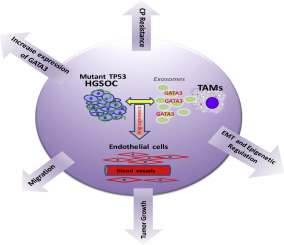当前位置:
X-MOL 学术
›
Cell. Signal.
›
论文详情
Our official English website, www.x-mol.net, welcomes your
feedback! (Note: you will need to create a separate account there.)
GATA3 as a master regulator for interactions of tumor-associated macrophages with high-grade serous ovarian carcinoma.
Cellular Signalling ( IF 4.4 ) Pub Date : 2020-01-11 , DOI: 10.1016/j.cellsig.2020.109539 Amr Ahmed El-Arabey 1 , Merve Denizli 2 , Pinar Kanlikilicer 3 , Recep Bayraktar 2 , Cristina Ivan 3 , Mohammed Rashed 1 , Nashwa Kabil 2 , Bulent Ozpolat 3 , George A Calin 4 , Salama Abdou Salama 5 , Adel Rashad Abd-Allah 5 , Anil K Sood 6 , Gabriel Lopez-Berestein 4
Cellular Signalling ( IF 4.4 ) Pub Date : 2020-01-11 , DOI: 10.1016/j.cellsig.2020.109539 Amr Ahmed El-Arabey 1 , Merve Denizli 2 , Pinar Kanlikilicer 3 , Recep Bayraktar 2 , Cristina Ivan 3 , Mohammed Rashed 1 , Nashwa Kabil 2 , Bulent Ozpolat 3 , George A Calin 4 , Salama Abdou Salama 5 , Adel Rashad Abd-Allah 5 , Anil K Sood 6 , Gabriel Lopez-Berestein 4
Affiliation

|
High-grade serous ovarian carcinoma (HGSOC) is the most lethal gynecologic cancer. Emerging evidence suggests that tumor-associated macrophages (TAMs) play an immunosuppressive role in the tumor microenvironment and promote tumor growth, angiogenesis, and metastasis in ovarian cancer. Therefore, targeting TAMs in patients with ovarian cancer is an appealing strategy; however, all trials to date have failed. To improve the efficacy of this approach, we sought to elucidate the underlying mechanisms of the role of TAMs in ovarian cancer. We found that the developmental transcription factor GATA3 was highly expressed in HGSOC cell lines but not in the fallopian tube, which is the main origin of HGSOC. GATA3 expression was associated with poor prognosis in HGSOC patients (P < .05) and was found to promote proliferation and migration in HGSOC cell lines. GATA3 was released abundantly from TAM cells via exosomes and contributed to tumor growth in the tumor microenvironment. Moreover, GATA3 acted as a regulator for macrophage polarization and interactions between TAMs and HGSOC to support proliferation, motility, and cisplatin chemoresistance in mutant TP53 HGSOC cell lines. Furthermore, GATA3 played a critical role in the interactions between TAMs and mutant TP53 HGSOC to promote angiogenesis and epithelial-mesenchymal transition with epigenetic regulation. Targeting GATA3 using GATA3siRNA in TAMs impeded GATA3-driven proliferation, migration, cisplatin chemoresistance, and angiogenesis in mutant TP53 HGSOC cell lines. Our findings indicate that GATA3 plays a novel role in immunoediting of HGSOC and demonstrate that GATA3 may serve as a prognostic marker for HGSOC and a promising target in the treatment of HGSOC.
中文翻译:

GATA3 作为肿瘤相关巨噬细胞与高级别浆液性卵巢癌相互作用的主要调节因子。
高级别浆液性卵巢癌(HGSOC)是最致命的妇科癌症。新出现的证据表明,肿瘤相关巨噬细胞 (TAM) 在肿瘤微环境中发挥免疫抑制作用,并促进卵巢癌的肿瘤生长、血管生成和转移。因此,针对卵巢癌患者的 TAM 是一个有吸引力的策略。然而,迄今为止所有的试验都失败了。为了提高这种方法的有效性,我们试图阐明 TAM 在卵巢癌中的作用的潜在机制。我们发现发育转录因子 GATA3 在 HGSOC 细胞系中高表达,但在输卵管中不表达,输卵管是 HGSOC 的主要来源。GATA3 表达与 HGSOC 患者的不良预后相关(P < . 05) 并被发现促进 HGSOC 细胞系的增殖和迁移。GATA3 通过外泌体从 TAM 细胞中大量释放,并有助于肿瘤微环境中的肿瘤生长。此外,GATA3 作为巨噬细胞极化和 TAM 与 HGSOC 之间相互作用的调节剂,以支持突变 TP53 HGSOC 细胞系的增殖、运动和顺铂化学抗性。此外,GATA3 在 TAM 和突变体 TP53 HGSOC 之间的相互作用中发挥了关键作用,以通过表观遗传调控促进血管生成和上皮间质转化。在 TAM 中使用 GATA3siRNA 靶向 GATA3 会阻碍突变体 TP53 HGSOC 细胞系中 GATA3 驱动的增殖、迁移、顺铂化学抗性和血管生成。
更新日期:2020-01-13
中文翻译:

GATA3 作为肿瘤相关巨噬细胞与高级别浆液性卵巢癌相互作用的主要调节因子。
高级别浆液性卵巢癌(HGSOC)是最致命的妇科癌症。新出现的证据表明,肿瘤相关巨噬细胞 (TAM) 在肿瘤微环境中发挥免疫抑制作用,并促进卵巢癌的肿瘤生长、血管生成和转移。因此,针对卵巢癌患者的 TAM 是一个有吸引力的策略。然而,迄今为止所有的试验都失败了。为了提高这种方法的有效性,我们试图阐明 TAM 在卵巢癌中的作用的潜在机制。我们发现发育转录因子 GATA3 在 HGSOC 细胞系中高表达,但在输卵管中不表达,输卵管是 HGSOC 的主要来源。GATA3 表达与 HGSOC 患者的不良预后相关(P < . 05) 并被发现促进 HGSOC 细胞系的增殖和迁移。GATA3 通过外泌体从 TAM 细胞中大量释放,并有助于肿瘤微环境中的肿瘤生长。此外,GATA3 作为巨噬细胞极化和 TAM 与 HGSOC 之间相互作用的调节剂,以支持突变 TP53 HGSOC 细胞系的增殖、运动和顺铂化学抗性。此外,GATA3 在 TAM 和突变体 TP53 HGSOC 之间的相互作用中发挥了关键作用,以通过表观遗传调控促进血管生成和上皮间质转化。在 TAM 中使用 GATA3siRNA 靶向 GATA3 会阻碍突变体 TP53 HGSOC 细胞系中 GATA3 驱动的增殖、迁移、顺铂化学抗性和血管生成。









































 京公网安备 11010802027423号
京公网安备 11010802027423号